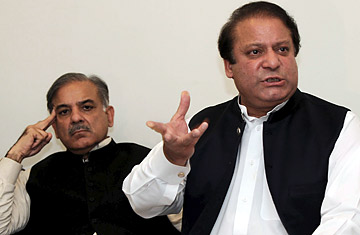
Shahbaz Sharif, the former Chief Minister of Punjab, left, and his brother Nawaz Sharif, a former Prime Minister, at a press conference in Lahore
(2 of 2)
"This is divisive and detrimental for democracy," says Mushahid Hussain, a prominent Senator and former Musharraf ally. "It has the worst political implications. Two provinces — Baluchistan and the North-West Frontier Province — are already destabilized. This adds the largest province to the list. We're headed back to the 1990s. Our political élite don't learn from their old mistakes. In pursuit of absolute power, they repeat the same mistakes."
Despite the denials from the ruling party, many observers believe political opportunism may have been in play. "Put it this way: Zardari did not try to block or prevent the ruling," says Nusrat Javeed, a political commentator. "Indeed, he waited for it to take political advantage of it." Others point out that Punjab Governor Salmaan Taseer recently boasted that the PPP would soon be in charge of the province.
The showdown between Zardari and the Sharifs had been brewing since the PML-N broke away from the ruling coalition following a dispute over the restoration of judges sacked by Musharraf. Zardari had agreed to reinstate Iftikhar Chaudhry, the deposed Chief Justice who became a symbol of the lawyer-led movement against Musharraf's dictatorship but then backtracked once the military ruler left office. Nawaz Sharif had since been quietly positioning himself as an alternative to the PPP, even as Zardari struggled to contend with the pressures of a souring economy, rising militancy and a diplomatic standoff with India in the wake of last November's Mumbai attacks. (See pictures of terrorism in Mumbai.)
The court's ruling is likely to feed support for the upcoming lawyer-led "long march," scheduled in two weeks. Sharif and smaller opposition groups maintain that Chaudhry is the rightful Chief Justice and should be reinstated immediately. The ruling coalition argues that he is "too politicized" to return to office. And while the opposition says it has no wish to derail Pakistan's fledgling democracy, critics fear that street protests could tip the country into deeper chaos, or even invite military intervention. Pakistan's armed forces have always been the country's ultimate power broker, if not its true center of power. Since the fall of Musharraf, the new army chief, General Ashfaq Kiyani, has kept a relatively low political profile. But few Pakistanis doubt the military's capacity to intervene if political chaos threatens the country.
Political turmoil will prove a major distraction from Pakistan's faltering fight against Islamic militancy. At a time when the government should be focused on staunching Taliban insurgencies in the northwest, it will now be trying to secure control of Punjab. Javeed believes that the younger Sharif's ejection from the province may prove to be a setback for the entire country. "You can disagree with his very strong style of governance," the commentator says. "But with a growing presence of the Taliban in the south, he was playing a role in stopping their spread. Now there is a vacuum. The government is also sending a wrong message. On the one hand, it is negotiating a deal with the Taliban in Swat, and on the other, it is pushing democrats out of the political system."
